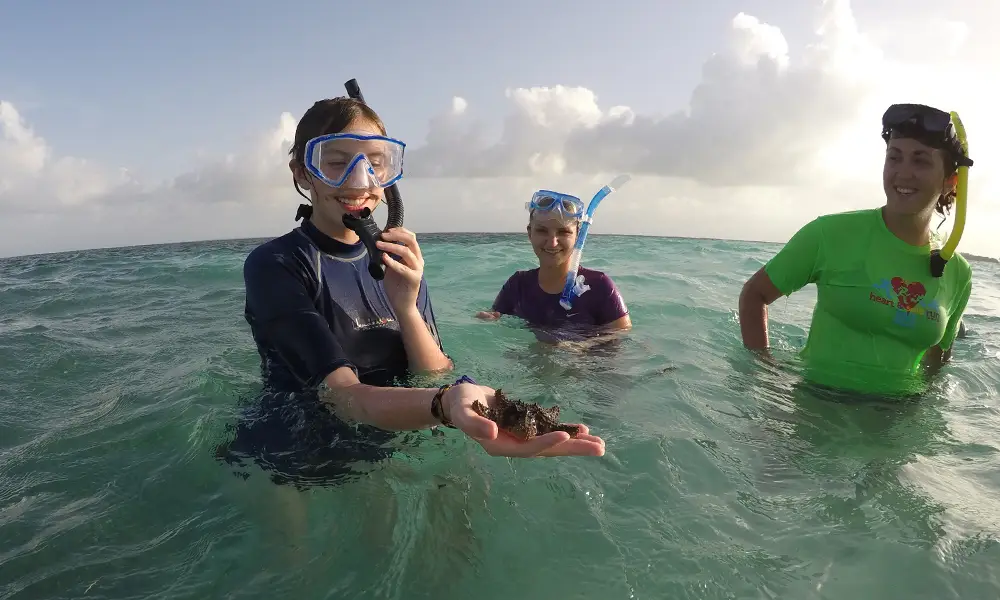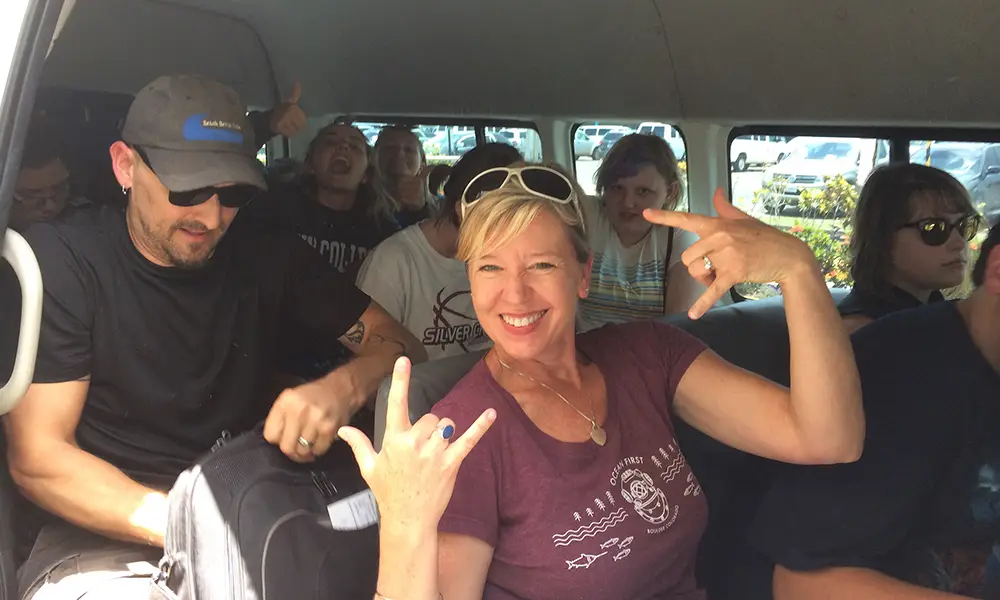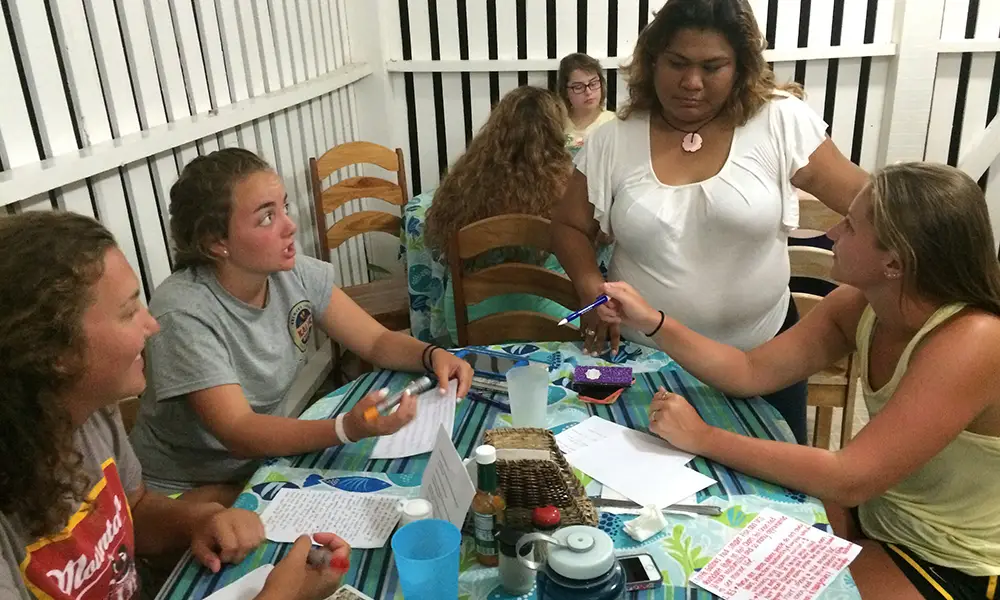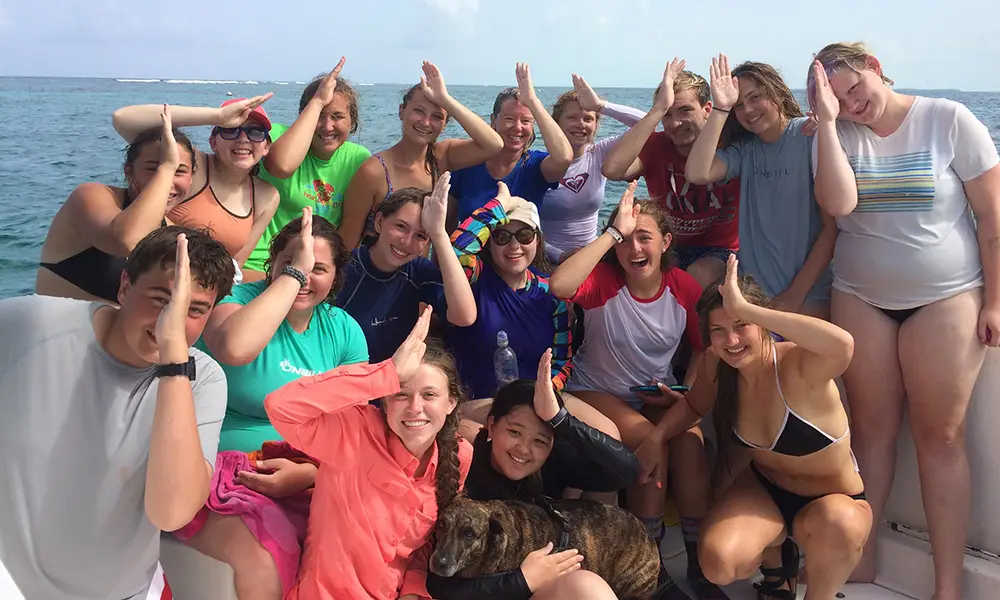This educational trip to Belize inspired a future generation.
Floating in the middle of the Caribbean Sea on the Belize barrier reef, I pulled my head from the water and rolled on my back to take in the surrounding setting. I was immersed in coral blue water. Looking east, I saw the endless horizon of the sea, in the far distance in all directions water and the outlines of small Caye’s, and below me, the most intensely beautiful coral reef and more wildlife in one view than I could possibly ever see in a full day of walking through the mountains in my home state of Montana.
More immediate to me, I saw bobbing heads and snorkel’s, my 16 high school students (the “Service Scholars”) and our personal guides and marine experts from EcoMar floating and diving over the reef. I hear the muffled scream of astonishment come from the snorkel tube of a nearby student and I look down below me and see a gorgeous spotted Eagle Ray swim below me, and then a docile nurse shark comes into view, and from nowhere just in front of me a stunning Permit fish. I too am astonished and cannot help but grin from ear to ear which consequently, immediately fills my mask with salt water. I turn over again, clear my mask and then notice my co-leader, Dr. Mikki McComb-Kobza a shark researcher, passionate ocean conservationist and Executive Director for the Ocean First Institute, swimming up to me. She says “Oh my gosh, did you see that spotted Eagle Ray? I can’t believe what we’re seeing.” I reply, “Mikki, look at this, look around us.” We see more bobbing heads, more muffled cries of astonishment, Nidia, one of our EcoMar instructors pointing out to a small group of students the green mora eel and other colorful fish. Mr. Johnny, part of the husband and wife team that run EcoMar, is showing kids how to clear their ears so they can dive deeper. One kid comes up and screams “I did it!” Another is struggling and Mr. Johnny gives her some more patient encouragement. I say to Mikki, “Can you believe this, look where we are. Look at what our students are doing, experiencing, and learning about. I have been dreaming and working for this type of experience with students for over 20 years, and it is happening.” We both grin, fist bump, then move on to join the others.

One of our first discoveries in the sea grass beds near our field station on St. George’s Caye. (Photo Credit – Dr. Mikki McComb-Kobza)

Dr. Mikki McComb-Kobza, Executive Director of Ocean First Institute showing her enthusiasm upon arrival in Belize!
In my 20+ years of working as an educator in the mountains of Montana and guiding student groups through the wilds of Grand Canyon, Teton, Yellowstone, Everglades National Parks, to Costa Rica and other destinations close to home and abroad, I have never had a group nor a trip like this. Don’t get me wrong, I can say with 100% certainty that all of my trips have been exceptional. There are moments of astonishment every time, students always test their comfort zones, make new friends and develop new skills and knowledge. But, this Service Scholars trip to Belize was different. Mikki has a similar background as mine in conservation and education and she felt the same. Our instructors at EcoMar also noticed how our group was “different”. Matt, our professional film maker on the trip to document everything, said the same thing and asked me one evening; “Paul, are all of your Global Travel Alliance groups like this? There is something different going on here.” The question is a good one and my response was “Yes, all of our groups are special. No matter where we go and what we do, our programs and our groups are different.” I know this because I hear it from the group leaders, our partners and vendors that tell us to bring more groups, and from others. But, I say to him,
“This group, this trip is taking things to the next level and it is intentional.”
The whole concept behind our Service Scholars program is to take students beyond the trip and to provide a program that helps build character and leadership skills, and also provides inspiration and perspective on possible future careers and to serve. The Global Travel Alliance Founder and President is a passionate educator and has instilled deep into the fabric of our company philosophy that at Global Travel Alliance, we are not just “tour operators”. We are educators first and thus we strive to do more than implement a tour – we want to build bridges and change lives. While we do this with every group, every year, we knew there is a next level for those students that want to go further and continue to partner with us. They want to experience new cultures, new landscapes and develop new skills. So, the Service Scholars program was born to bring these “next level” travelers to the next level with humanitarian, science/environment trips to Costa Rica, New York City, the Dominican Republic, Belize, and elsewhere. The result of implementing these kinds of programs are what Mikki, Matt, myself and the staff at EcoMar were observing and I couldn’t be more proud of the students we were with. Wow – awesome – life-changing – pride. And that is not even the half of it.
These 16 students from Montana, Colorado and one student from Pennsylvania (Hey Shelby!), came together for the first time at the airport and within minutes were already bonding and playing games. Nearly all of them had been on at least one trip with Global Travel Alliance. A few had gone to Costa Rica as a service scholar in the past year or two to build a home for a Costa Rican family in need. The others, well they simply loved the idea of hanging out with this cool shark researcher (i.e. Mikki) and spending five days on a remote Caye in Belize. What can be bad about that – am I right?
During our five days at St. George’s Caye and two nights in the jungle near San Ignacio, we learned about the history and culture of Belize and specifically the significance of St. George’s Caye. We did research on conch’s in the ocean, we learned about and witnessed the difference in diversity, abundance and size of wildlife in marine protected areas versus none protected areas, and more. We swam with sea turtles and learned about Linda Searle’s research on sea turtles. We learned about, swam with, observed and assisted with dolphin and manatee research led by Eric Ramos. And we all became more comfortable swimming, snorkeling and exploring not as just passive visitors but as citizen scientists helping with research in the ocean.
Lastly, and perhaps more importantly, we served others. Our research contributed data to the long term monitoring of Conch’s conducted by EcoMar. We helped Eric get a better understanding of the dolphins and manatees that inhabit the area. And ultimately, the students put all of this new knowledge and experience to work by developing in small groups. Some ideas came up like how stakeholders (i.e. fisherman, tourists, researchers, conservationist) can work together and develop plans to meet the multiple interests of all stakeholders – a community based conservation plan.

Ecomar staff assisting the Service Scholars with their small group discussion on how best to protect Belize’s marine wildlife and resources. (Photo Credit – Finn Belanger)
Our final two days were spent inland in the hills and jungles of western Belize were we got to experience another side of life in Belize and another landscape full of exotic birds, lush jungle forest and exceptional caves, waterfalls and swimming holes. Our exploration of the Actun Tunichil Muknal (ATM) caves and the Mayan ceremonial ruins was, for many, the most challenging part of the trip, and for others the absolute highlight. Who in our group would have ever believed we were caving 1500 meters in and 300 ft underground in these other-wordly caves? I am pretty sure none of us did.
As a result, all of these students were changed. Some more profound than others. Some with deep impactful “aha” moments that provided direction and context for their lives now and into the future. Some realized areas of personal growth, leadership and relationships with peers and others.
These outcomes became apparent on our final night. Mikki and I decided to keep our primary teaching tools limited to the experiences themselves and journaling. After all, what can top learning about coral reefs when you are snorkeling in one of the best reef systems in the world? Giving the kids time to journal allowed them to document their personal experience and for reflection. The day before our final night, we provided a simple journal exercise that would help students reflect on what they have experienced, how it has affected them, and what they are going to do with this experience.
On our final night together, Mikki and I shared our reflections and invited the others to share theirs:
“I am just so inspired by spending time with and observing such passionate people like Mikki, Eric, Paul and the others. I mean, it shows that you can follow your passion and inspires me to do the same.” Ellie
“I had a lot of travel challenges getting here. But, I would do it all again for all of the new friends and relationships I have made here. Not just the students, but the relationships with the researchers, our 12 year-old friend here at the resort, and so many others.” Shelby
“As I get ready for my final year in high school and think about what to study in college, I have kind of been leaning to something in the environmental sciences. This experience has solidified my belief in my career choice and that is what I want to pursue. And, seeing all of these passionate people doing what they love to do, changing the world, but really just so chill and easy to hang out with.” Finn
“Seeing people talk about what they love with fire in their lives solidified my future that I want to help people.” Natalie
“I want to bring this experience to other people.” Abby
“I learned that you do not have to like everything you are doing but if you have the opportunity, do not waste it because it has changed me.” Katie
“I was so caught up in the moment that it was hard to stop and realize everything we are doing, learning, and experiencing. These moments when you asked us to stop and reflect were so important – not everyone gets an opportunity like this and I was not going to miss any of it.” Minica
“I am starting college and know that I want to be an elementary school teacher. But these last two days, when we were walking through the small village seeing the families and kids, hanging out with our 12 year old friend/guide Kevin who took us to his favorite swimming hole and waterfall, I knew in my soul that this is where I need to be – that this is what I want to do.” Rachel
Mikki and I are planning a 2017 trip to Belize and other adventures around the globe together. It is partnerships, a strong belief in what you are doing is important, skills and experience, and good people that what make these programs so special. While this trip for both of us is a pinnacle moment, we both intend and know that it is not the top nor the end. I can’t wait to meet our group for next year and build a few more bridges and change more lives.
As is common in this day and age, I shared some of my pictures using social media. One of my partners, an 8th grade teacher who I work with every year on his trip to Washington, D.C. commented, “You have the best job in the world.” I have to agree! Thank you to the Oceanic Society, Ecomar, Ocean First Institute, my colleagues and friends at Global Travel Alliance and most importantly, to the amazing young men and woman who I travel with for this privilege.
Want to be a Service Scholar? Or know someone who does?
Click here to email Paul or visit www.globaldoinggood.org to get involved.

Our crew with the EcoMar dog Amber after a full day of exploring the Belize coral reefs and marine wildlife. (Photo credit – Finn Belanger)
